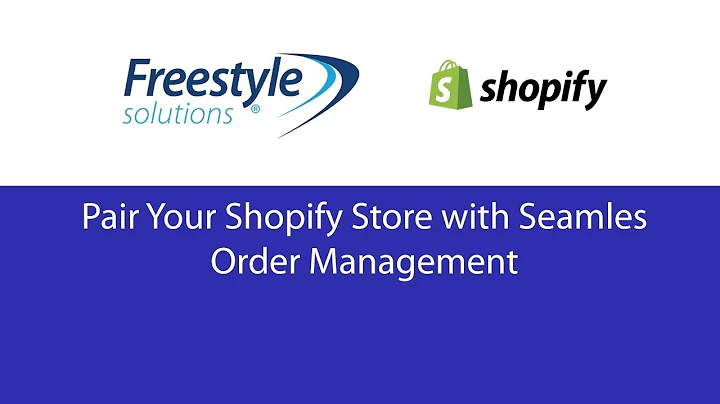The Best Payment Processors for Shopify Dropshipping
Table of Contents
- Introduction
- What is Payment Processing for Small Businesses?
- Factors to Consider when Choosing a Payment Processor for Small Business
- Transaction Fees
- Pricing Structure
- Good Customer Service
- Simplicity
- Popular Payment Processing Companies for Small Businesses
- Clover
- Square
- Stacks
- Stripe
- Payment Depot
- Helsim
- Pros and Cons of Each Payment Processing Company
- Clover
- Square
- Stacks
- Stripe
- Payment Depot
- Helsim
- Conclusion
Article
The Best Payment Processors for Shopify Drop Shipping
When it comes to running a successful Shopify drop shipping business, choosing the right payment processor is crucial. Payment processing is the critical function of accepting payments from customers for goods and services online. It is important for this process to be efficient, secure, affordable, and user-friendly. In this article, we will explore six popular payment processors for Shopify drop shipping and compare their features, pros, and cons. By the end of this article, you will have a better understanding of which payment processor is best for your Shopify drop shipping business.
What is Payment Processing for Small Businesses?
Before we dive into the payment processors, let's first understand what payment processing entails for small businesses. Payment processing involves a customer, a merchant, a payment processor, a payment gateway, the customer's bank or credit card company, and a merchant account. It is the function of facilitating the transfer of funds from the customer to the merchant in exchange for goods or services. Payment processing should be efficient, secure, affordable, and user-friendly to ensure a smooth transaction experience for both the customer and the merchant.
Factors to Consider when Choosing a Payment Processor for Small Business
When it comes to choosing a payment processor for your small business, there are several factors you should consider. These factors will help you determine which payment processor is the best fit for your business needs and goals. Here are some key factors to consider:
Transaction Fees
Transaction fees are an important consideration when choosing a payment processor. While credit card transactions typically carry higher fees than debit and ACH transactions, credit cards are popular among customers, making credit card processing essential for many small businesses. It is crucial to pay attention to credit card transaction fees and other variables such as fees for online transactions versus in-person transactions. Look for a payment processing plan that offers competitive rates for the types of transactions your business frequently handles.
Pricing Structure
Different payment processors offer different pricing structures, and the most cost-effective model depends on your average transaction volume and average transaction amount. Common credit card payment processing pricing structures include flat rate pricing and interchange plus pricing. Flat rate pricing charges merchants the same percentage rate calculated as a percentage of the total transaction cost, regardless of the card type used. On the other hand, interchange plus pricing structures vary the cost based on the card type. Consider your business's transaction volume and amount to choose the pricing structure that offers the best value for your business.
Good Customer Service
Having good customer service is crucial when dealing with payment processors. The payment solution should be easy to use for both you and your customers and should also be reliable. If your credit card processor malfunctions, your customers will be unable to make purchases, which can damage customer relationships and halt revenue generation. Look for a payment processor that offers 24/7 support via phone or chat, making it easy to seek help if you have questions or encounter problems. Choosing a payment processor with strong merchant support can help resolve issues quickly and ensure reliable payment acceptance.
Simplicity
Payment processing can be complex, and many payment processors offer additional services and add-ons that may or may not be beneficial to your business. It is important to choose a payment processor that offers the services you need without subsidizing services that benefit your competitors instead of you. Opt for the simplest payment solution possible to ensure that your processing fees aren't inflated with unnecessary services.
Popular Payment Processing Companies for Small Businesses
Now that we understand the factors to consider when choosing a payment processor, let's explore six popular payment processing companies for Shopify drop shipping. Each of these companies offers unique features and pricing structures. Understanding their features, pros, and cons will help you make an informed decision when selecting the best payment solution for your Shopify drop shipping business.
1. Clover
Clover is a cloud-based point-of-sale (POS) system and merchant service provider that offers in-store and online payment processing technology. It uses a flat rate pricing structure for in-person payments, ranging from 2.3% to 2.6% plus 10 cents per transaction. Online rates come in at 3.5% plus 10 cents per transaction.
Pros:
- Offers advanced features such as inventory management and employee scheduling.
- Provides an integrated customer relationship management (CRM) system.
- Offers advanced analytics to help merchants track and optimize their business.
Cons:
- Cost may be a concern, as monthly software subscription fees can be higher compared to competitors.
- POS hardware can be expensive for small business owners.
2. Square
Square is an inexpensive payment solution that operates on a flat rate pricing structure. It charges 2.6% plus 10 cents for in-person transactions and 2.9% plus 30 cents per online transaction.
Pros:
- Price is a major selling point, as Square imposes no monthly subscription, activation, refund, or chargeback fees.
- Offers a variety of features designed for small businesses, including POS systems, free invoicing functions, and a free mobile device and card reader.
- Provides 24/7 customer support for its paid plan options.
Cons:
- Does not work with high-risk merchants.
- The Square API requires a greater degree of software development skill compared to other platforms.
3. Stacks
Stacks is a membership-style merchant account provider that charges businesses a monthly subscription fee ranging from $99 to $199, plus interchange fees and a per transaction fee ranging from 8 cents to 15 cents.
Pros:
- Offers round-the-clock customer service.
- Provides same-day funding options.
- Includes PCI compliance features.
Cons:
- Requires a flat-rate monthly subscription, making it less suitable for businesses with a low volume of monthly transactions.
- Does not work with high-risk merchants.
4. Stripe
Stripe is a credit card processing company that uses a flat rate pricing structure. It charges 2.9% plus 5 cents for online payments and 2.5% plus 30 cents for in-person transactions.
Pros:
- Charges no monthly subscription fees and no setup fees.
- Offers 24/7 customer service.
- Accepts payments in over 135 different currencies and offers a variety of extensions for sales analytics, inventory management, customer management, and tax calculation.
Cons:
- Does not work with high-risk merchants.
- Requires a greater degree of software development skill for integrating with the Stripe platform.
5. Payment Depot
Payment Depot is a membership-based merchant account provider that charges interchange fees plus a per transaction fee ranging from 7 cents to 15 cents.
Pros:
- Offers a 90-day risk-free trial and charges no cancellation fees.
- Provides PCI compliance and 24/7 customer service.
- Transaction costs are determined by the plan type, making it straightforward for businesses to understand the fees they will incur.
Cons:
- Does not work with high-risk merchants.
- Membership-based pricing may be less suitable for businesses with lower monthly credit card income.
6. Helsim
Helsim is a merchant account provider that charges interchange fees plus 0.3% of the total transaction cost and 8 cents per transaction for in-person payments, and interchange fees plus 0.05% of the total transaction cost and 25 cents for key transactions.
Pros:
- Charges no monthly subscription fees, setup fees, PCI compliance fees, or cancellation fees.
- Offers volume discounts for businesses that process more than $25,000 a month in transactions.
- Provides 24/7 customer service and a wide range of payment processing features.
Cons:
- Does not work with high-risk merchants.
- Volume discounts make Helsim a better choice for high-volume businesses rather than low-volume ones.
Conclusion
Choosing the right payment processor for your Shopify drop shipping business is crucial for success. By considering factors such as transaction fees, pricing structure, good customer service, and simplicity, you can make an informed decision. The six popular payment processing companies mentioned in this article - Clover, Square, Stacks, Stripe, Payment Depot, and Helsim - each offer unique features and pricing structures. Evaluate the pros and cons of each company to find the best payment solution for your Shopify drop shipping business.


















